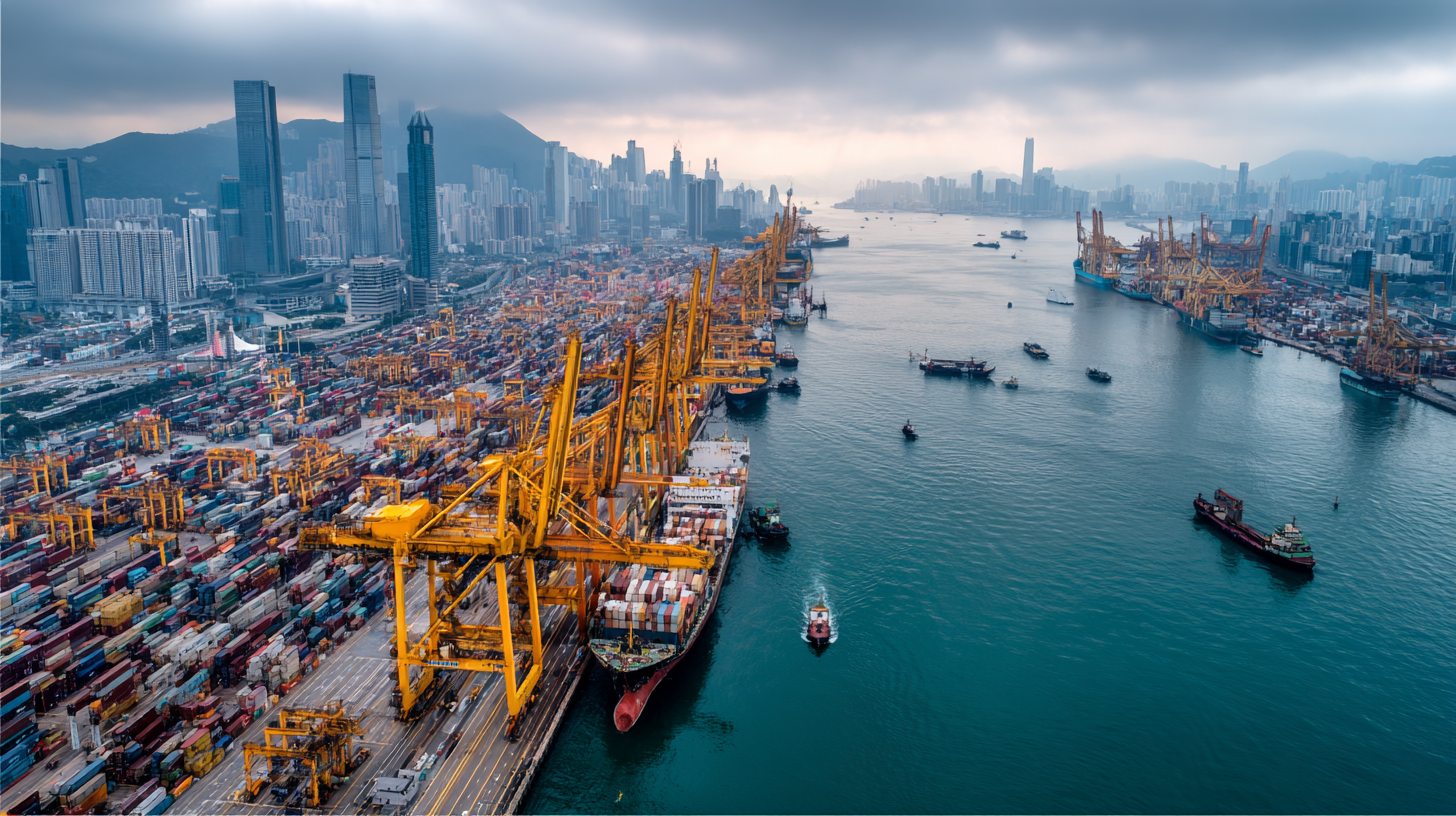Step-by-Step Guide to Sourcing the Best China VFD for Your Business Needs
Table of Contents
- Understanding Variable Frequency Drives (VFDs) and Their Benefits for Your Business
- Identifying Your Specific Business Requirements for VFDs
- Researching Reliable Suppliers and Manufacturers in China
- Evaluating VFD Specifications: Key Features to Consider
- Navigating the Import Process for Sourcing VFDs from China
- Building a Strong Relationship with Your Chosen Supplier for Future Needs
- FAQS
- Related Posts
In today’s fast-changing industrial world, finding the right Variable Frequency Drive (VFD) can really make a difference when it comes to boosting performance and efficiency across different applications. The global VFD market was worth around $15 billion back in 2020, and it’s expected to hit about $25 billion by 2026 — all because more and more companies are looking for energy-efficient solutions and smarter automation in their manufacturing processes. At Zhejiang Chuanken Electric Co., Ltd., we’ve been in the game for over 15 years, focused on developing and making industrial automation control products. We totally get how crucial a reliable China VFD is for keeping your operations running smoothly and productively. This step-by-step guide is designed to help you find the best China VFD that suits your specific business needs, so you can stay ahead in this pretty competitive market.

Understanding Variable Frequency Drives (VFDs) and Their Benefits for Your Business
Variable Frequency Drives, or VFDs, are pretty much essential in today's industrial setups. They come with a bunch of perks that can really boost efficiency and save energy. So, what do they do exactly? Well, VFDs basically control how fast and how much torque electric motors deliver by tweaking the frequency and voltage of the power they get. This means companies can pretty much fine-tune their machinery to run just right, which cuts down on energy waste and helps lower operating costs. Plus, by adjusting motor speeds based on what's actually needed, businesses can get better control over their processes and, in turn, improve product quality.
But, honestly, the benefits don’t stop at saving energy. VFDs give you more flexibility — think smoother operation overall, and less strain on the equipment. That’s a big plus because it means your machinery lasts longer and doesn’t need as much maintenance. And on top of that, they help make things safer. Smooth starts and stops mean fewer sudden jolts, which is safer for workers and can help prevent accidents. As more companies focus on being sustainable and efficient, understanding how VFDs work can really help you make smarter choices when picking out the right drives for your specific needs.
Identifying Your Specific Business Requirements for VFDs
Looking to pick out a variable frequency drive (VFD) for your business? First things first, you really want to get clear on what you actually need. Every application is a bit different, so understanding the ins and outs of your operation is key. For example, think about the kind of motor you're running, the load it’s handling, and where you’re using it—these details will seriously influence which VFD is right for you.
**Pro tip:** Spend some time analyzing your machinery and how you use it day-to-day. Make notes of the speed ranges you need, torque specs, and any environmental stuff like temperatures or humidity that could impact performance. Doing this groundwork helps you get a solid grasp of what specs are non-negotiable.
Another thing to keep in mind is making sure your new VFD plays nice with your existing setup. You’ll want to check if it integrates smoothly with your current equipment and control systems. Look out for communication protocols like Modbus or Ethernet/IP—that way, everything talks to each other without a hitch.
**Another tip:** Bring your engineering team into the mix early on. Their insights can help catch potential issues before you’re knee-deep in installation or startup. Getting everyone on the same page from the start really makes the whole process much easier and less stressful.
Researching Reliable Suppliers and Manufacturers in China
When you're on the hunt for a Variable Frequency Drive (VFD) supplier in China, it’s super important to find someone you can trust. Recent industry reports show that China makes up over 60% of the global VFD market, so honestly, narrowing down your options to reputable brands is a must. I mean, a study from ResearchAndMarkets predicts that the VFD market will grow at around 7.2% annually between 2021 and 2026—mainly because more industries are chasing energy efficiency. That’s a pretty clear sign that you should be choosing suppliers who are not just established but also innovative enough to keep up with changing tech and market needs.
To really find reliable manufacturers, try checking out platforms like Alibaba or Global Sources—they’re packed with suppliers, many of whom have verified credentials. It’s a good idea to look for ones that have been around for more than five years and hold international certifications like ISO 9001. Also, reading customer reviews and even doing factory visits when possible can really give you a better idea of how capable and dependable they are. Plus, according to Technavio, the push for high-quality VFDs isn’t just about the market—advancements in automation and smart tech are playing a big role. So, picking a supplier that's keeping up with these trends can actually make a difference in how smoothly your operations run down the line.
Evaluating VFD Specifications: Key Features to Consider
When you're shopping for a Variable Frequency Drive (VFD) from China, it's pretty important to pay attention to some key specs—that’s what really affects how well it works and how efficient it is. I came across a report from Research and Markets that says the global VFD market is expected to hit around $16.8 billion by 2027, so you see, it’s becoming super popular across various industries. One of the main things to look at is the power rating. Make sure the VFD can handle or even surpass your motor’s horsepower and voltage needs—otherwise, you might end up with overheating or inefficiency issues.
Here's a tip: check out the drive’s control method—like whether it uses voltage/frequency (V/f), vector control, or direct torque control (DTC). Those details can really influence how fast it responds and how well it delivers torque, depending on what you're using it for. Also, pay attention to the operating temperature range and the IP rating to make sure the VFD will hold up under your specific working conditions.
Another thing that’s super important is the communication features. Being able to hook up your VFD with your existing automation systems using protocols like Modbus, Ethernet/IP, or CANopen can make a huge difference in how smoothly everything runs. The International Energy Agency mentioned that high-quality VFDs can save you anywhere from 30 to 50% in energy—pretty significant, right? So, investing in a VFD that supports your preferred communication protocol isn’t just about current needs; it can also save you money in the long run and give you better control over your processes.

Navigating the Import Process for Sourcing VFDs from China
Trying to figure out how to import Variable Frequency Drives (VFDs) from China can be pretty overwhelming, especially these days with all the uncertainty around tariffs and trade rules. If you’re in the game, you probably know that new tariffs can really shake up your costs, making it crucial to rethink your sourcing strategy. Recent industry stats show that nearly 60% of manufacturers have had to tweak their sourcing plans because of changing tariffs. So, it’s a smart move for businesses to diversify their supply chains—going beyond the usual markets—to reduce risks. Of course, it’s not just about price; dependability and on-time delivery are just as important.
Plus, supply chain issues can pop up in all sorts of ways—delayed shipments, unexpected fees, you name it. A survey from last year revealed that 40% of companies working with Chinese suppliers faced problems like goods being held up or disputes that never got resolved. That’s why it’s so important for importers to have solid contracts in place and stay flexible so they can handle surprises better. Here at Zhejiang Chuanken Electric Co., Ltd., with over 15 years under our belt in industrial automation, we totally get these sorts of challenges. Our goal is to help our clients get reliable, high-tech VFD solutions while smoothly navigating the tricky waters of international trade.
Step-by-Step Guide to Sourcing the Best China VFD for Your Business Needs
| VFD Type | Power Rating (kW) | Input Voltage (V) | Control Method | Price Range (USD) | Lead Time (Weeks) |
|---|---|---|---|---|---|
| Single-Phase VFD | 0.75 | 220 | V/F Control | 150-200 | 2 |
| Three-Phase VFD | 1.5 | 380 | Sensorless Vector Control | 200-300 | 3 |
| High-Performance VFD | 5 | 400 | Vector Control | 500-800 | 4 |
| Compact VFD | 0.5 | 220 | V/F Control | 100-150 | 1 |
| Heavy-Duty VFD | 15 | 480 | Vector Control | 800-1200 | 6 |
Building a Strong Relationship with Your Chosen Supplier for Future Needs
Building a solid relationship with your supplier is honestly one of those things that can make or break your business in the long run—especially if you're sourcing VFDs from China. The very first step is to keep the lines of communication wide open. Chatting regularly about your specs and what you need helps clear up any confusion and gives your supplier a good feel for how your business works. When you both stay in sync, it builds trust, making sure you're on the same page about quality and delivery timelines.
Also, taking the time to learn about your supplier’s operations and the challenges they face can be a total game-changer. Showing genuine interest in what they do and any hiccups they might encounter invites collaboration on solutions that work for everyone. Whether it’s dropping by for a site visit, having regular check-ins, or even partnering together on new projects, these kinds of efforts help turn you into more than just another customer—they make you a valued partner. And that kind of relationship can lead to cooler perks like better pricing, faster service, and tailored solutions that actually fit your needs. Basically, building that relationship now sets the stage for a win-win situation down the line.

FAQS
: VFDs are devices that control the speed and torque of electric motors by adjusting the frequency and voltage of the power supplied, enhancing operational efficiency and energy savings.
The main benefits include energy savings, improved machinery performance, reduced operational costs, increased flexibility, decreased mechanical stress on equipment, lower maintenance costs, and enhanced safety.
VFDs optimize motor speeds based on specific requirements, which can lead to energy consumption reductions of up to 30-50%, improving overall operational efficiency.
Key specifications include the power rating, control method, operating temperature range, environmental protection rating (IP rating), and communication capabilities with existing automation systems.
The control method (such as voltage/frequency, vector control, or direct torque control) affects the response time and torque performance, which can vary based on the application.
A strong supplier relationship can lead to better product quality, aligned expectations, preferential pricing, priority service, and tailored innovative solutions, ensuring long-term success.
Open and regular communication helps clarify expectations, builds trust, and allows for a better understanding of each other's capabilities and challenges.
Features include high communication capability for integration with automation systems, proper power rating, suitable control methods, and protection ratings for various environments.
VFDs enable softer starts and stops, reducing the risk of sudden jolts that could pose hazards to workers, thereby improving workplace safety.
Businesses should engage in thorough evaluations of specifications, maintain open communication with suppliers, and foster strong partnerships to ensure their unique needs are met effectively.
Related Posts
-

How to Choose the Best China VFD Frequency Inverter for Your Industrial Needs
-

10 Secrets to Finding the Best Chuanken Soft Starter for Your Business Needs
-

Leading Global Factory for Best 2 Phase Vfd Solutions You Can Trust
-

Ultimate Guide to Selecting the Best 50Hz and 60Hz Soft Starters: Industry Insights and Strategies
-

Understanding Import and Export Certifications for the Best Vfd Control Board in Global Markets
-

Solutions for Optimizing Performance with Best Vfd Software

